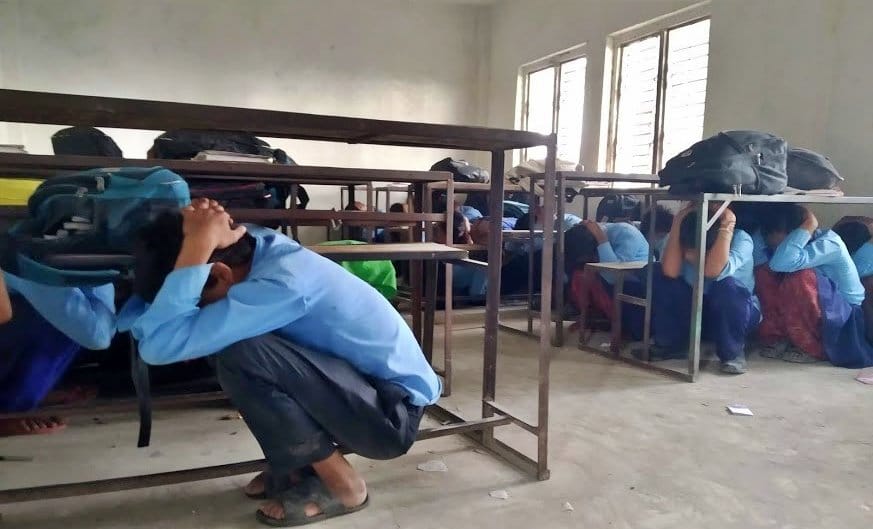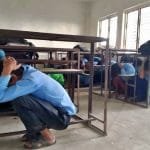
The Disaster Risk Reduction (DRR) Education Project fulfills the DRR awareness gap existing in our communities. The earthquake danger in the cities of Nepal has increased; with unmanaged urbanisation, poorly planned building construction and insufficient public awareness on preparedness. Out of 21 most seismic susceptible cities in the world, Kathmandu is at peak risk in terms of impacts to people. Promptly growing migration, non-compliance to construction regulations, disproportionate water extraction in violation of public land and insufficient government intervention have intensified the susceptibility at a substantial rate. In Nepal, floods and landslides cause around 300 deaths annually and economic damage figures above US $10 million. These disasters have disturbing prices in both human life and monetary terms, and these costs are excessively borne by the underprivileged and marginalised population.
One of the most important apprehensions of Disaster Risk Reduction in Nepal is that people are unwilling to pledge pre-disaster procedures at the individual effort. However, this tendency can be changed by mobilising the entire community for Disaster Risk Reduction Education via support measures such as those offered by VIN.
The major goal of DRR Education project is to raise awareness among the public on what to do/what not do in the events of a natural disaster. The community people will be trained to be self-resilient and develop key guidelines and approaches as disaster response. For instance; giving practical and applicable advice or drills to people, how to pack an emergency bag, how to organise large furniture in your house, where to take shelter at times of disaster etc. could create a self-reliant task-force of local people.
VIN is looking for volunteers or interns with understanding and acquaintance in the arena of disaster risk reduction education. During your engagement you will live together with a local Nepali host family getting you involved in Nepali language and culture. On the basis of your proficiency, the DRR Education volunteer/intern will perform one or more of the following activities:
- Organize and develop disaster education programs in schools focusing on both structural and non-structural methods
- Focus on the most vulnerable section of a population and conduct capacity development/ skill enhancement sessions
- Reinforce the capability of people and societies to decrease their risk, vulnerability and boost social cohesion
- Initiate a disaster management program in community settings and invite them to voice their opinions and distresses
- Conduct workshop on WASH (Water Sanitation & Hygiene) with children in community schools
- Assist in developing community capacity for engaging in local-level risk-reduction action, undertaking vulnerability reduction measures
- Conduct frequent interactive awareness programs for the community in the form of media presentations, group discussion, campaigning etc.
- Promote better understanding of hazards and related disaster risks
- Actively conduct awareness and counseling programs targeting various section of population
- Provide a clear insight about the importance of preventive measures with supporting evidences
- Facilitate training for emergency management and preparedness along with strengthening response capacity
Project Specific Skills
- Background or experience in Disaster Risk Reduction
- Proficient in conducting workshops and training
- Presentation skills
- Counselling skills
Desirable/ Common Skills
- Excellent communicator with good interpersonal skills
- A team player with good workethics
- Time management and leadership qualities
- Adaptable, flexible and able to work under pressure
- Accepting of different ideas and culture
- Problem solving: always be part of solutions than part of a problem
- Creative
- Positive attitude
Requirements
- Gender: Female / Male
- Minimum Age: 18+ years (16-17 years old person can volunteer but need to present parents’/ guardian’s consent letter)
- Language:English (Intermediate)
- Educational:High School Graduate
Your Experience/ Setting
Upon your arrival at Kathmandu Tribhuvan International Airport (TIA), you will receive a warm welcome and be transported to your hotel or hostel. If you are already in Nepal before the start of your placement, we can make alternative arrangements for you. You will undergo a comprehensive two- to three-day induction program after arrival. This induction will provide valuable information about your project and general information about the Nepalese language, culture, health, safety, and security. It is also an excellent opportunity to connect with fellow volunteers and interns who can become your companions for sightseeing and a source of support throughout your volunteer placement.
During the induction period, you will be accommodated in a budget hotel or hostel arranged by VIN. However, most of the VIN experience involves living with a Nepalese host family. While this immersion is essential for a complete experience, we understand that it can be challenging as you adapt to a new culture and adjust to facilities that may be more basic than you are accustomed to. Don’t worry; all our host families have experience accommodating volunteers, although their English-speaking abilities may vary. Also, you will have 24-hour access to our staff members for support and assistance throughout your placement.
Volunteers will be assigned to one of VIN’s working areas, which include Tarakeshor Municipality in Kathmandu, Taluwa, Thulachhap, and Bhadaure in Okhaldhunga, and Okharpouwa and Kaule in the Nuwakot district. While at the working site, volunteers are requested to bring their lunch box, water bottle, safety gear, face mask, and any other essential belongings. We advise volunteers to dress comfortably and modestly, preferably with long sleeves. Please get in touch with us for guidance and support if you want to raise project funds or collect project-specific resources. This will help the community a lot.
Schedule and Commitment
You will work five to six days a week, up to six hours per day. You may propose your preferred time and hours; however, the working time period will be dependent on the institution you have been placed. A minimum of 2 weeks’ time commitment is expected of a volunteer. The longer you commit; the better impact you can make. You should be willing to commit a certain amount of your free time and energy, show a lot of commitment and be a good listener. You are expected to work constructively and co-operatively maintaining good reputation and standards at all times. Volunteer should abide by relevant security concerns and access procedures. Moreover, you should be receptive and positive to performance appraisal, advice and feedback. Throughout your placement, you will have the full support of VIN. Your safety is our highest priority.
Your typical day might look like this:
| 07:00-08:00 | Tea/Leisure Time |
| 08:00-09:00 | Breakfast/Brunch (Nepali meal – Daal-Bhaat) |
| 09:00-10:00 | Preparation for sessions |
| 10:00-13:00 | Conduct Research |
| 13:00-14:00 | Lunch (Packed lunch) |
| 15:00-17:00 | Deliver sessions to people on a cluster basis |
| 17:00-20:00 | Preparation for next day/Leisure time |
| 20:00-21:00 | Dinner (Nepali meal – Daal-Bhaat) |
You will receive a clear and concise on-the-job instructions, course of action, context of work and policies/strategies before your placement begins. You will be provided with ample of guidance and support throughout the placement with trainings / onboarding sessions incase necessary. You will be in a constant communication and regular check-in with the VIN volunteer coordinator. VIN aims to maintain a culture of continuous feedback between the volunteer supervisor at the placement to monitor the performance of the volunteer and ensure the project delivers desired outcomes.
In case of an emergency, you may contact one of our Volunteer Coordinators who will be available anytime for your assistance and support.
Click here to Learn more on how volunteering works
Mid and Long Term Volunteers:
2 weeks minimum stay- € 380
3 weeks – 480€
4 weeks – 580€ (after 4th week, for each additional week €95)
University Internships:
4 weeks minimum stay- € 680 (for each additional week – €105
Click here to Learn what’s included and excluded in our Fees Section
Click here to Learn recruitment process on how volunteering works
Our projects are open year-round, and our inductions begin on the first and third Mondays of each month. We would like to ask that volunteers arrive one day before the start of the induction. You can choose the duration of your participation based on your available time. However, so that you know, our volunteering placements are limited. We highly recommend booking your placement in advance to secure your placement. Click here to apply.


 Member of
Member of